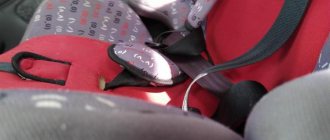What is physical punishment
Before delving into the topic of the article, let's look at what physical punishment is.
Physical punishment is the establishment of boundaries of what is permitted through fear and pain.
If corporal punishment is used once for any disobedience of a child, he understands what can be done and what cannot be done for fear of getting hit in the bottom with a belt again.
Of course, a child must understand the boundaries of what is good and what is bad. Fear of being punished is a limit.
But here it is important to understand that the child may not violate the prohibitions not because of his moral convictions, but because he is afraid of being punished.
Some people do not break the law out of fear of punishment, while others do not commit these acts because of their moral beliefs. For example, some people do not steal because they are afraid to bear responsibility, while others do so because they are convinced that stealing is completely immoral. Which of these options is most suitable for you?
So is it possible or not?
Psychologists believe that no, most parents believe that it is possible, but in exceptional cases. However, it is important to understand why you are punishing your child, what you want to achieve, and what the result should be. A spank in the heat of anger because the child “got into trouble” is not a good thing. You can't do that. Most often, corporal punishment has to be used due to pedagogical helplessness, and the parent who has stooped to it must be aware of this.
After the child is born, they must slap him lightly on the bottom. He must scream, thereby forcing all the organs of the respiratory system to work. And the child must scream within the first few minutes.
Not always. If the child did not cry. The first child was “spanked” to my indignation, and this fact was explained to me. The second child screamed on his own, no one spanked him, he was swaddled, and allowed to be put to the chest. It was new then. So, rather, not “for what”, but “why”, “for what”.
Before birth, the child freezes, that is, does not show active activity to make childbirth easier for the mother. The midwife revives the child with a strong slap on the bottom, he wakes up and begins to scream, and at this moment the baby’s lungs open and begin to perform their function.
In order to shout and lightly straighten out, not everyone is slapped on the butt, some of them themselves scream without help.
In order for his lungs to reflexively open.
This is done so that the child screams and thereby stimulates the work of the child’s entire body, internal organs, in particular the respiratory tract. if the child does not cry after this, it means he has some kind of health problem, perhaps with the lungs, this means something is wrong with him.
Many people were spanked by their own parents as children, so they consider it acceptable to use the same discipline methods on their children. According to some reports, more than 300 million children are subjected to such punishment, while spanking is light, does not cause pain, but only corrects behavior.
For centuries, this system of education existed in almost every family, and adults did not particularly think about whether it was possible to hit a child on the bottom. Scientists have come to the defense of the younger generation, whose research has confirmed that this technique leads to unpleasant consequences for them, both physiologically and emotionally.
Let's figure out whether it is possible to hit a child on the butt with your hand, how adequate such punishment is, whether the use of a belt is justified, and whether it is worthwhile to practice punishing young children at all.
Reasons for using physical punishment in the educational process
Some parents are sure that it is very difficult to explain something to difficult children without resorting to shouting and a belt. Such people limit the child’s independence, believing that this can lead to problems.
If we analyze cases of physical punishment, it becomes clear that a child receives corporal punishment not only because of disobedience. Basically, the reason is the bad mood of the adult.
Why else might there be a desire to hit a child?
- Mom or dad may grab the belt to realize some personal grievances from childhood without realizing it
- Own failure. Each person may have various problems: at work, in his personal life, etc. Thus, a parent can lash out at his child, even if he has not done anything wrong, he just fell under the hot hand
- Sometimes the use of physical punishment may be due to the fact that the adult does not have the time or desire to explain to the child what he has done wrong
- Helplessness. Sometimes parents simply don’t know how to behave with their child if he has committed an offense, and how else to punish the child
- Unstable psyche. In a fit of anger, such people cannot control themselves or cope with negative emotions. Therefore, they see no other choice but to hit the child. Often, after physical punishment, the parent blames himself very much for it
Reward methods
Children must be both encouraged and punished. A child is a small, not fully formed creature; he knows no boundaries, he has no clear boundaries, no understanding of life. All he knows is what we put into him. The child’s good deeds, his victories, efforts and efforts must be encouraged. And the best encouragement for a child is the recognition and praise of his parents.
The more a child hears encouraging, warm words from mom and dad, the better he develops, the easier he learns, the stronger and more self-confident he becomes.
We praise children constantly. We tell the girls all the time how beautiful and smart they are. We encourage their every achievement, desire to help, manifestation of compassion and mercy. I can say that this method is already bearing fruit: their hearts have absorbed so much love, tender words, warm glances, kisses and hugs that they simply cannot help but share it with the world!
Possible consequences of assault
If suddenly someone hits you, what will be your attitude towards this person? What do you think is different about a child in such a situation? Nothing. Children who are subjected to physical punishment want revenge. Naturally, they cannot cope with adults, so they choose weaker ones as victims: animals or younger children. Improper upbringing can lead to various problems, and also give rise to sadists and even maniacs. Many of them were subjected to domestic violence as children.
When a parent raises his hand to a child, he begins to think that:
- You can beat the weak
- Adults cannot cope with a child and his misdeeds in other ways.
- Physical strength is the right approach to solving problems
- Parents should be feared, they cause fear
- The baby is unable to fend for himself
According to statistics, the majority of parents take the position that children should not be beaten. However, in reality it happens differently and from time to time the child still receives a belt on the butt for the purpose of education. Of course, any mother can be very tired, have a bad mood, or feel bad. But this is not a reason to take it out on your beloved baby. The next time you feel an attack of anger coming on, try closing your eyes and counting to 10, go to another room, direct your anger, for example, at a pillow. In general, try to do anything but not hit the child.
Parenting with a belt can affect the development of a child’s personality. What happens if you hit a child, or why you shouldn’t hit children?
- If physical force is often used in raising a child, then he can grow up to be a person without his own opinion. These children are more likely than others to succumb to bad influences, fall into bad company, lead a riotous lifestyle, and use illegal drugs.
- Most often, children who are beaten do not realize the true reason for the punishment, but they understand that they have done something wrong. Thus, the child develops the opinion that it is necessary to do so so that the family does not find out about it
- This method of punishment suppresses the child’s “own self.” Children listen to other people without having their own opinions
- Over time, the child may get used to physical pain, but the psychological trauma will remain for life
- People who were subjected to physical punishment in childhood build their own families on the same principles. So, if force was used in raising a girl, then it is likely that she will look for a strong, powerful man who can also use force. If the boy was raised with a belt, then he will do the same with his wife and children
- If you beat a child at an early age, he may begin to feel fear of everyone who is larger and older than him. The child grows up shy, withdrawn, with low self-esteem
- There is a possibility that an adult child will treat his parents the same way
- According to statistics, about 90% of murderers were subjected to domestic violence. And some even killed their own parents
It is obvious that children who are beaten for educational purposes grow up either tyrants or insecure. Such punishments can lead to big problems, traumatizing the psyche.
Is it acceptable to spank children?
Let me make a reservation right away that this is a polemical article. I don't know for sure whether it's okay to spank children. The eldest of my four children is still only nine years old, and the fruits of our upbringing can be objectively assessed after sixteen.
But the Western idea that no, no, you can’t touch your children, through the efforts of well-known liberal publications, is becoming almost religiously canonical before our very eyes - even in the Orthodox environment. I would like to make several arguments in favor of the traditional point of view on this issue.
What age are we talking about?
In modern Western psychology, it is believed that the best punishment for children is the “natural consequences” of their wrong actions. That is, the parent does not insist on his point of view, he is eliminated, the child makes the mistake that he dreamed of making, and deals with the consequences of his mistake. Through this, according to many psychologists, he learns to live in the best and most natural way.
I completely agree that, starting from the age of seven, there is no longer any need to influence children physically. Firstly, at this age they can already explain everything or almost everything in words. And at worst, there is a “method of natural consequences”, and at this age the child is able to draw conclusions from these very consequences independently or with the help of his parents.
Therefore, in this article I am talking about children up to about seven years of age (depending on development). When not everything can be explained to a child in words. And he himself is not always able to connect his actions and their consequences in his consciousness.
My personal opinion on the acceptability of spanking
At this stage of my development as a parent and teacher, I believe that physical influence on a child is acceptable to the extent that the parent loves his child .
That is, if a parent is psychologically healthy and truly loves his child, then his spanking will not cause mental harm to the child, since he will perceive it as a manifestation of care, love, and not hatred.
If the child does not see or feel true love from the parent, then spanking will be perceived as another manifestation of parental dislike and will cause harm.
It is important to note here that not all parents truly love their children.
As all Orthodox Christians know, love is the pinnacle of perfection. A mentally imperfect, passionate person either loves his child with sick love (sometimes this is pure dependence, not love), or someone else becomes the object of his main dependence (husband, cohabitant, lover), and the parent is cold or treats with negativity.
Of course, none of us is perfect; each of us is somewhere on this segment between perfect love and non-love. Therefore, no one can say that spanking is always used in an absolutely proportionate manner and only when it is impossible to do without them.
Perhaps in Western society, where love in general is cooling, the attitude that spanking is unacceptable has its reason. But among us, Orthodox Christians, love still glimmers!
Next, in an effort to avoid platitudes, I would like to immediately move on to arguments in favor of the traditional point of view on this problem.
Price issue
It is clear that any pain caused to a loved one is in itself evil, not good. But there are situations when you have to choose between two evils.
For example, a child is interested in an electrical outlet. You can’t explain the danger of electric current to him in words. You can't make all outlets safe. Yes, you can create a safe environment in your home, but sometimes this is impossible to do somewhere in a hotel. It is impossible to make the entire world around a child safe!
Thus, there are situations when a choice arises between a mortal danger for the child and the risk of causing mental trauma to the child through a spank on the bottom.
What choice should a loving parent make in this case?
And if in this situation we allow spanking, then that means the principle “you can’t spank” is not absolute? So, are there other exceptions possible?
Conspiracy of the Advanced
Psychology and pedagogy have their own environment, their own “scientific community.” And many specialists are afraid of losing their reputation as “advanced” ones who own the latest technologies. Spanking a child is a “Stone Age”, “house-building” thing.
Just as in biological circles it is risky to question Darwin's hypothesis, and in Western society as a whole it is risky to doubt the usefulness of homosexual couples and individuals.
This is one of the reasons why it is so rare to see professional material advocating the permissibility of spanking. Career and money are more important. And in Russia as well.
"British scientists have proven..."
In articles by psychologists in favor of the inadmissibility of physical punishment of children, quite massive Western research is often mentioned. The subjects were divided into two groups: those who beat children and those who did not, and found that children who were not beaten were, on average, mentally better off than those who were beaten.
It would seem like ironclad proof! But if you think about it, it proves absolutely nothing. And that's why.
The point is not whether parents spank their children or not, but how much of their mental and intellectual strength they give to the child
If parents do not spank their children at all, then it is clear that they spend their time and energy on explanations, persuasion, and argumentation. From this it is obvious that “non-beating” parents are, on average, much more patient and intellectually developed than “beating” ones, and devote more time to their children. After all, all these explanations and exhortations require time and a developed verbal apparatus, but you can strike very quickly and without thinking.
Therefore, the result of the study is absolutely natural.
But the fact is that the group of “beaters” is not homogeneous. It contains both underdeveloped, drinking, indifferent, aggressive parents, and loving and psychologically healthy parents. Moreover, the latter, given that the study was conducted in the West with its active juvenile services, are an overwhelming minority. (The majority of developed and responsible parents there are forced to be in the “don’t hit” group.) So we get this “average temperature in the hospital.”
It would be very interesting to compare the results of raising psychologically healthy, responsible, loving parents of two types - spankers and non-spankers. This would be an accurate and in-depth study. True, it is unlikely that anyone in the West will conduct such a study, because its results may not please the professional community.
Is a spanking the most harmful punishment?
I think even the most Westernized psychologist working with adults will not deny that there are many punishments that cause much more harm than physical ones.
There is such parental punishment as silence. Some “non-spanking” mothers subject their children to it, not realizing that this punishment is much more painful than any spanking.
Punishment by silence is much more painful than any spanking, and the most painful wounds come from the derogatory words of parents
It is painful even for adults (when it happens between spouses). What can we say about children, especially small ones, who imagine their very existence only in an inextricable connection with their parent, in the rays of this “sun”. They experience a real shock at such punishment! But such punishment lasts much longer than a couple of spanks.
And yet the most severe traumas remain from parental words. From swearing, from the stigma that a parent puts on his child. “You’re worthless,” “you’ll never have friends,” “nothing will come of you,” “you’re trash”—such verbal “admonitions” determine the inner world, and in many ways, the fate of a child who has become an adult.
Therefore, not spanking does not mean protecting your child from all evil and damage.
Which method is more advanced?
We are Christians and are called to be perfect, not in accordance with the canons of this century or the legislative system of the state, but like Christ.
And how does Christ God deal with us, His children? Does He beat us?
Here's what the Bible says:
- “For the Lord punishes whomever he loves; and he beats every son whom he receives” (Heb. 12:6).
- “Whoever spares his rod hates his son; but whoever loves disciplines him from childhood” (Proverbs 13:24).
- “Foolishness is attached to the heart of a young man, but the rod of correction will remove it from him” (Proverbs 22:15).
- “A wise son listens to his father’s instruction, but a violent son does not listen to reproof” (Prov. 13:1).
- “The rod and reproof give wisdom; but a child left neglected brings shame to his mother” (Proverbs 29:15).
- “The Lord punishes those who approach Him only for admonition” (Judith 8:27).
- “Those whom I love, I rebuke and punish. Therefore, be zealous and repent” (Rev. 3:19).
Well, painful and enlightening events from one’s own life are known to every reader. Nothing happens without God...
Some will say that this is a completely different case. But why another?
And someone will say that God uses the “method of natural consequences” in relation to us. This is definitely wrong. For it was none other than God who made painful consequences the natural result of errors and passions. As the Creator of everything, He might not have established such a pattern, but He established it for our good.
What method will bring a child closer to God?
A child who was spanked by loving parents will respond with understanding to the admonishing tragedies in life
It is known in psychology that the image of a father (or stepfather) is superimposed on the image of God and largely shapes it. Therefore, it is more difficult for those who did not have a loving father to believe in a loving God.
If a parent is loving and spanking (where there is no other way), he forms in his children an image of God that is close to the real one. The child of such a parent will treat the tragedies of his life with understanding and trust.
What will happen to the child of a loving but non-spanking parent? Will he be able to accept a God who admonishes painfully?
There are so many godless cries around: “My loved one is sick. If there was a God, he would not have allowed this!”, “If there was a God, then there would be no wars!”, “If there was a God, then children would not die!”
conclusions
Let each parent draw conclusions for himself.
Personally, I consider the best punishment and admonition to be such a traditional method as standing in a corner. Being alone with yourself and reflecting is always useful, even without guilt.
But there are different situations, different ages, different children and different parents...
The main thing is to learn to truly love your children. Love will help you choose the most appropriate forms of caring for your children.
How to stop
It is important for parents to understand that using physical force in raising a child is unacceptable. Imagine if your child is hit by a stranger, how will you feel? Why then can parents themselves allow themselves to raise their hands against a helpless baby? A child is not a thing, it is not the property of mom and dad, a child is a person who needs to be raised, not trained. Of course, there are situations when it is very difficult to remain calm and keep your emotions under control. You need to learn to restrain yourself and use different methods. Here are some of them:
- In a moment of anger, try slowly counting to 10
- Take the baby by the shoulders and, looking him in the eyes, tell him sternly that his behavior is terrible. If the baby is calm, explain what he did wrong
- Try singing songs if you feel like you're about to explode
- Go to another room and try to calm down
- Direct your aggression, for example, at the pillow
- Consider whether your child’s misdeed is worth physical punishment
You can't hit children. There are effective alternatives
It must be remembered that physical punishment is a weakness, not a strength of parents, a manifestation of their failure. And excuses like “he doesn’t understand differently” remain just excuses. In any case, there is an alternative to physical violence. For this:
- You should distract the child and switch his attention to something interesting.
- Engage your baby in an activity that will make him want to be naughty and capricious.
- Hug your baby and convince him of your love. Afterwards, you can spend at least a couple of hours of your own “precious” time with the baby. After all, the child lacks attention ( Read also: Very simple ways to show children that you love them).
- Come up with new games. For example, you can collect scattered toys in two large boxes, first one. The reward could be a good bedtime story from mom or dad. And this will work better than a slap on the head or a cuff.
- Use loyal methods of punishment (deprivation of a laptop, TV, going for a walk, etc.).
READ ALSO:
- To hit or not to hit? The story of a mother who is condemned by everyone -
- 8 loyal ways to punish children. How to properly punish a child for disobedience -
- 7 blunders of parents during quarrels with children -
- How not to punish a child -
- Is it necessary to punish a child at 3 years old: the opinion of parents and a psychologist -
It is important to learn how to get along with your child without punishment. There are a huge number of methods for this. There would be a desire, but you can always find an alternative. It is important for any parent to understand that children should absolutely not be beaten under any circumstances!
Is it possible to beat a child for educational purposes?
Physical punishment can be different, some spank the child once, while others use force regularly. In addition, the strength of women's and men's hands is also different. Mom may not hit the butt too hard, but dad may not calculate the force of his blow. In addition to physical pain, the baby may be left with psychological trauma.
Is it possible to beat children for educational purposes? It is possible if the parents want the child to live only the way they require, so that he cannot independently learn to make decisions and be responsible for his actions. It is possible if the parents want the child to be afraid of them and always remember such punishments, and not the warmth, affection and love of the parents. Of course, the easiest way is to punish the child with a belt, and not to educate the child and clearly explain to the child why this should not be done.
After reading the article, we can say with confidence that you should not beat children. But there is one “but”. Psychologists say that raising a hand against children is strictly not recommended, except in situations where the life and health of the child are at risk.
For example, a child runs out onto the roadway, turns the handle of the stove, ignores his parents and goes to the cliff, etc. If the child does not want to listen to his parents, explanations do not help, and does not understand how dangerous this can be, then the use of physical punishment is allowed. But you don’t need to immediately grab the belt and hit the child forcefully. You can lightly slap him on the butt, pull him back, or lightly hit him on the hands. Such a blow should not be painful, but rather offensive. Then calmly explain to the child the danger of his actions.
Opinion of American scientists
The truth that childhood experiences influence later life is familiar to everyone. Physical violence from loved ones is a common factor in the development of psycho-emotional disorders and neurological diseases in adulthood.
Scientists from the United States studying the consequences of using physical punishment for educational purposes provide some shocking data. Thus, people who were regularly slapped and slapped on the head were characterized by reduced intellectual abilities.
In especially severe cases, we were even talking about mental and physical impairments, since the centers responsible for processing and storing information, speech and motor functions were seriously damaged.
In addition, according to the same American scientists, children subjected to corporal punishment are more prone to vascular diseases, diabetes, arthritis and other equally serious diseases as they grow up.
Also, teenagers whose childhood was marred by parental aggression are more likely to become drug addicts, alcoholics and criminals. They also adopt a cruel parenting style and transfer it to their own children. That is, a kind of vicious circle is formed in which aggression gives rise to cruelty.
It should still be noted that this work was criticized by other experts. Some scientists felt that there were certain excesses in the data presented. For example, the researchers did not bother to divide into groups sadistic parents and those mothers and fathers who occasionally use light corporal punishment.
That is why it is extremely difficult to judge whether spanking and slaps on the head can actually lead to mental impairment or heart problems in adulthood.
Alternative methods of punishment
Of course, it is impossible to completely avoid punishment. This is an important part of raising a child. But it is necessary to punish correctly so that the child realizes his guilt and the possible consequences of what he has done. Each parent chooses their own methods of punishment, based on the individual qualities of their little one. Below are examples of how you can punish a child without resorting to a belt:
- Deprive your child of something he really likes: watching animated series, sweets
- While in a public place, ask a passerby if your child is behaving well. Children usually feel ashamed if a stranger makes a remark
- Don't talk to your child for a while, ignore him
- Try making a remark in a stern voice. The baby should feel the confidence and firmness of your intention
- Take the toy away from the child and send it to a corner for a while.
- If a child tries, for example, to pour salt into a mug of drink without responding to your comments, allow him to do this. Let the child understand that such actions are wrong. This way children learn from their mistakes
- Send your child to your room for a long time, depriving him of games, watching TV and other activities. Children are very active and energetic, so sitting for a long time without interesting activities is a real punishment for the baby.
Remember, any punishment must be justified. Always clearly explain to your child what he did wrong.
Do not insult the baby or resort to threats (if you behave this way, I will send you to an orphanage). A child should grow up not only in a healthy body, but also strong in spirit and with a strong psyche.
Alternative measures do not work: what to do?
Many parents, reading such advice, begin to think that the authors live in some kind of parallel or ideal reality, in which the child is always obedient, and the mother is always calm and balanced.
Of course, there are situations when requests, persuasion, and explanations are not able to help calm and bring a stubborn or enraged child to a normal emotional state.
In such a situation, as some experts are sure, a light slap can switch attention and become a kind of inhibitor of a psycho-emotional surge. Naturally, the strength of the spank must be controlled (as well as your mental state).
In addition, corporal punishment (we are not talking about flogging in this case) is not excluded if:
- childish behavior poses a direct threat to the life and health of the little hooligan (poking fingers into sockets, playing with fire, moving towards the road, approaching the edge of a cliff, etc.);
- the child has crossed absolutely all limits of what is permitted, clearly trying to piss you off, and he does not respond to other disciplinary measures and may even behave inappropriately (see the previous paragraph).
After a light spanking, it is imperative to explain what the punishment was for and how to behave correctly. Don’t forget to also say that it is the action you don’t like, and not the child himself. You still love him.
General characteristics of the educational process
From the first movements, the baby is subject to correction of his actions by adults: “quit immediately”, “don’t go there”, “don’t do that” and much more. Parents do this for educational purposes, while developing a certain parenting style:
- Authoritarian - education is reminiscent of animal training or army drill. The baby must strictly follow the instructions of adults so as not to be punished. Children are forced to get used to such treatment, although some experience hysterical manifestations, causing adults to need to physically impose orders (they may spank them with a belt or slap them on the back of the head).
- Democratic – constant communication with the toddler, giving him the right to his opinion and position. This style is characteristic of parents who invest as much as possible in the educational process and strive to form a holistic personality in their child.
- Mixed – the famous “carrot and stick”, when adults navigate according to circumstances, tightening restrictions or loosening them. Typically, this technique is used when there is not a lot of time for education - in the case of an offense, light punishment and the introduction of restrictions, in case of obedience and good behavior - rewards and a comfortable mode of growing up.
Mistakes are part of life
Teach your children to this idea. Errors are an integral part of the learning process. Admit to yourself: “I beat my child.” Give him a hug and tell him straight out that you made a mistake. What to do? Ask for an opportunity to correct it. Children will understand that adults also make mistakes, but everything can be corrected. And then they will apply the same approach in another situation.
Some would argue that this is a long way to go. You can achieve something much faster if you use physical punishment from time to time.
But children remember the attitude towards them. Next time they will behave well not because they want to, but in order to avoid scolding from their parents, and not feel pushes and slaps. Or for a fee - toys, attractions, an extra hour on the computer.
And then they will give the same education, based on fear and profit, to their children.
Mothers often ask friends and specialists: “Why do I beat my older child, what should I do?” Because the little one is still weak and fragile, his parents don’t raise their hand to him. Bye. Later it will be his turn. In the meantime, the baby sees that the mother does not know how to restrain herself and not hit. He is happy with only one thing - good, I didn’t get it.
But this method will help to raise a weak creature who will try with all his might to avoid punishment, to be cunning, to dodge. A child whose parents don’t know how to stop yelling at a small child and hitting him on the bottom will begin to take revenge on his parents and take out his anger on those who are weaker (younger children, animals). Chain reaction. Therefore, physical violence is a dead end.
Reasons for children's disobedience
Children often go against their parents, refusing to behave well or doing the exact opposite. As psychologists have found, there are several reasons for this:
- desire to assert oneself;
- an attempt to attract parental attention;
- persistence in contradicting adults;
- diffidence;
- mistakes in education;
- excessive expectations from your child.
Each toddler is a unique personality, and as soon as he begins to think, he perceives himself as an independent person, remaining a baby in the eyes of adults. If you constantly pull him back and get irritated by his attempts to do something, then the psyche can suffer, and self-esteem can greatly decrease.
Against this background, parents wonder why they can’t spank their child’s bottom with their hand, since he doesn’t obey? Because he makes attempts to prove his own independence.
How to overcome disobedience?
Since the child does not obey and continues to behave badly and do everything in defiance of adults, is it possible to hit the child on the butt with a belt? No! First of all, this problem of parents is the choice of method of education.
In Japan, for example, children under five years of age cannot be scolded or punished at all - a sacred period in the life of every person, when he is raised only with words. Likewise, Russian parents must find an adequate replacement for spanking with a hand or a belt:
- switching attention to any other object;
- take him home or away from the place where he began to act up;
- talk, trying to solve a problem in conversation.
In extreme cases, you can shout at the toddler, pull his hand or take away his toy.
Unfortunately, many teachers in kindergartens do not think about why they should not hit children on the bottom, and use spanking to deal with an obstinate child. This is strictly prohibited!
To find out about this, parents should ask their toddler about everything that happens in kindergarten and look for mentions of physical abuse. It is important to protect your child, even if he is punished with the best intentions.
The effect of corporal punishment on a child
Physical and psychological punishment of children is prohibited by law, but many parents practice this method, considering it the most effective. Adults often cannot contain their anger; it is easier for them to hit the butt with a belt than to explain to a child in understandable language that he is wrong. If you use a method of education such as corporal punishment, then expect consequences. Often a little person develops a fear, which can subsequently greatly affect his future life.
If a child is afraid of a loved one, then this may in the future affect his interpersonal relationships, adaptation in society, and at work. Parents should know that it is impossible to hit their butt, humiliate, or shout at their heir, because he can grow up unsure of himself, without aspirations in life. He will think that whoever has the power is right.
Physical effects of corporal punishment
Very often, corporal punishment leads to physical injury to your child. This is due to the fact that many parents do not calculate their strength when punishing their children. Getting used to slaps on the butt occurs, especially if they are used every day. This leads to the fact that the child’s behavior does not change, and the strength of bodily influences increases. The result is severe bodily injury.
Without controlling himself, a parent is capable of causing injury to a child that is incompatible with his life. And then punishing children will lead to disastrous consequences. Cuffs and slaps on the head cause the baby to hit a sharp corner or other objects in the house.
Physical consequences can manifest themselves in the form of enuresis, various tics, encopresis, etc. Don't hit children, be more reasonable! After all, the child is several times smaller than you.
Results
Let's figure out why parents resort to violence against their children? Do they have the right to do this? Theoretically, they do: the baby is completely at the mercy of the adults. The dependent position gives parents the right to go too far for educational purposes at any time. However, this is simply an excuse for their pedagogical failure: mothers do not want to waste energy convincing their baby. The simplest and easiest way is to hit the butt with a swing.
The educational process is never smooth and takes a lot of mental energy from adults. However, it is important to demonstrate patience and understanding towards the little person. Why can't you hit children? Physical impact:
- harms health;
- cripples the psyche;
- provokes retaliatory aggression;
- creates a feeling of embitterment.
Many kids withdraw into themselves and try to distance themselves from the endless stream of criticism. Over time, you may end up with an uncontrollable teenager who is angry and violent. It is better not to use physical force for educational reasons.











